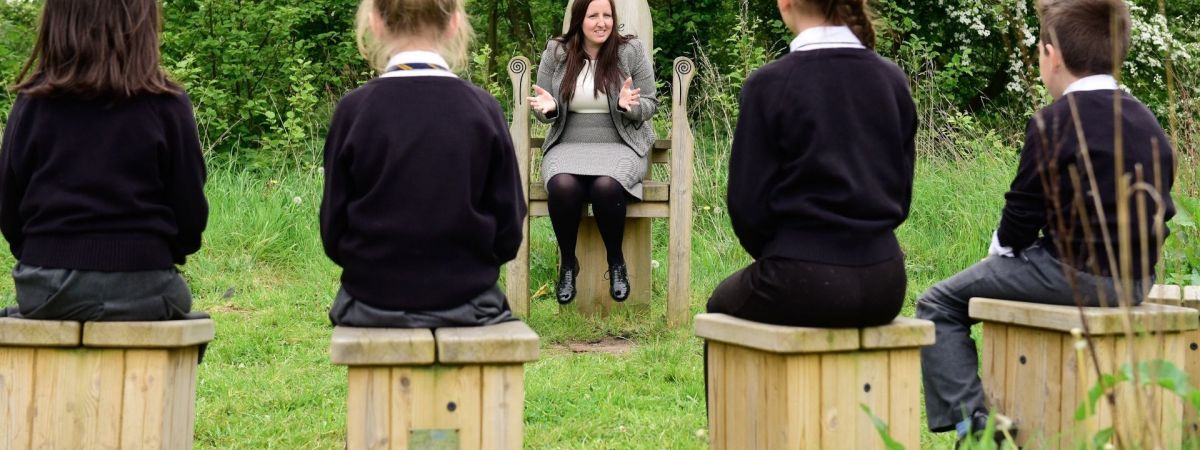National Poetry Day 2017
Today is National Poetry Day, with the theme being ‘freedom’ – to celebrate, we asked a few teachers to discuss a poem they teach on this theme and why. The poems themselves aren’t reproduced here for the sake of brevity, but links to all three are included.
Michael Merrick, Deputy Head at St Ninian Catholic Federation on The Ballad of the White Horse by Gilbert Keith Chesterton
‘Before the gods that made the gods/Had seen their sunrise pass/The White Horse of the White Horse Vale/Was cut out of the grass.’ So begins Chesterton’s epic poem The Ballad of the White Horse, a poem we at the St. Ninian Catholic Federation look at with our UKS2 children during the summer term. It has everything one could wish for; from the whole gamut of poetic devices to analyse and pick apart, to the epic narrative, with Alfred, on bended knee, receiving a vision from Our Lady, before gathering together those of goodwill to crush the invading Danes. Theology, history, geography, poetry, and incredible imagery, all in one place – what could be better?
June Rhodes, English teacher at Bennett Memorial School on The Lady’s Dressing Room by Jonathan Swift
I teach Swift’s poem, The Lady’s Dressing Room to A-Level Literature classes as part of their study of Love Through the Ages. It is a rather extreme example of Enlightenment period satire, less well known than Swift’s essays and novels. It is interesting not only because of Swift’s very crude language but also as it could be studied as an example of misogyny in a period when many writers were trying to embrace ideas about women’s education and rights, following Rousseau’s philosophical writing on education and equality. An unknown female poet wrote an equally crude and vicious reply to Swift’s poem: The Gentleman’s Study, in which she describes “Strephon” with the same contempt with which Swift describes “Celia.” Such a bold reply from a female writer, even anonymously could be argued as an early example of the fight for gender equality and freedom.
Jon Brunskill, English teacher at Reach Feltham on Invictus by William Ernest Henley
Few works of literature stir such emotion than the final couplet of Invictus:
I am the master of my fate,
I am the captain of my soul.
This rousing finale is not the only reason that I have taught the poem to every class I’ve ever taught. At only 16 lines, it’s short enough for children as young as year two to memorise, and I’ve been delighted with the dozens of seven year olds in my class who have taken up this challenge over the years.
There is also defiant theme running throughout the poem which I find much more powerful than any growth mindset lesson. This becomes much more real when children learn that Nelson Mandela used to recite the poem to fellow inmates at Robben Island. The stoic message is visceral; nobody can take your dignity, your freedom, without your permission. Do not give it to them.
And now, with the Invictus games featuring widely in the news, children have another hook with which to attach the poem. Freedom is something that is within you, and seemingly impossible barriers can be overcome if you refuse to bow to them.
I’m a strict teacher, one who expects compliance during lessons, so it’s perhaps this that makes teaching this poem all the more powerful and meaningful for me. For older children, in upper key stage two, we’re able to explore what makes something right or wrong, and when it’s appropriate to challenge authority. While it’s important for children to learn how to behave in school, and to follow instructions of caring adults, it’s also necessary for them to learn that moral truth is something that they must engage with on a personal level, and that in the end you are most accountable to yourself.
Most of all, though, it is simply a joy to recite. A simple rhythm allows the powerful message to take centre stage, and it is easily performed with sincerity and conviction. I will never tire of hearing children in primary school speak Henley’s words, and am deeply grateful for the conversations that it leads to.
